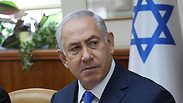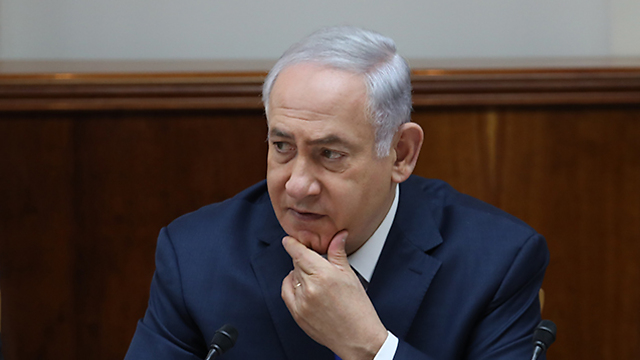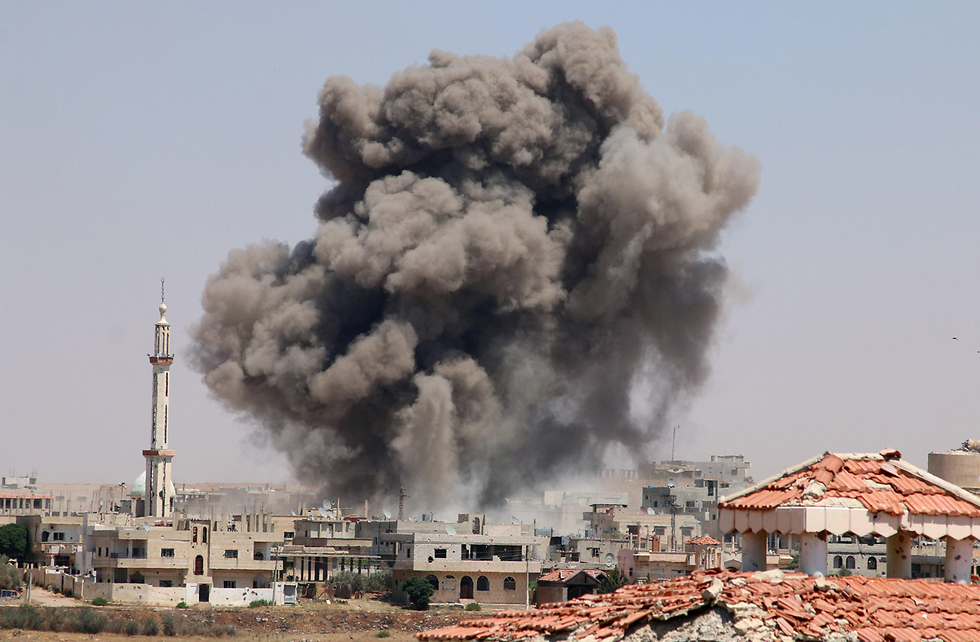
Netanyahu cautiously welcomes southwestern Syria ceasefire
As the ceasefire goes into effect midday, PM says Israel 'will welcome a genuine ceasefire in Syria but this ceasefire must not enable the establishment of a military presence by Iran and its proxies in Syria in general and in southern Syria in particular.'
Prime Minister Benjamin Netanyahu cautiously welcomed a ceasefire in southwestern Syria agreed upon by the United States and Russia, which went into effect midday on Sunday.
"Israel will welcome a genuine ceasefire in Syria but this ceasefire must not enable the establishment of a military presence by Iran and its proxies in Syria in general and in southern Syria in particular," Netanyahu said Sunday at the outset of the weekly government meeting.
He said he discussed the matter last week with US Secretary of State Tillerson and Russian President Vladimir Putin. "Both told me that they understand Israel's position and will take our demands into account," Netanyahu added.
"For our part we will continue to monitor developments beyond our borders while strongly upholding our red lines: Prevent the strengthening of Hezbollah via Syria, with emphasis on the acquisition of precision weapons, prevent Hezbollah—or Iranian forces—from establishing a ground presence along our border, and prevent the establishment of an Iranian military presence in Syria as a whole," the prime minister went on to say.
So far, there have been no air strikes or clashes in the area since the ceasefire took effect, according to Syrian rebel and opposition representatives. The Syrian Observatory for Human Rights, a Britain-based monitor, said "calm was prevailing" in the area. A rebel official in Deraa city also said there had been no significant fighting.
Since the beginning of the civil in Syria, there have been repeated spillovers of mortar fire and other forms of ammunition from Syria into Israel, as recent as last week, with Israel then retaliating.
The ceasefire, announced after a meeting between US President Donald Trump and Russian President Vladimir Putin in Hamburg last week, is the first initiative by the Trump administration in collaboration with Russia to bring some stability to war-torn Syria.
The ceasefire is based on Syrian President Bashar Assad staying in power on the one hand, and preventing further advances by forces backed by Iran, including Lebanon's Hezbollah militia.
According to the Associated Press, both Jordan and Israel were involved behind-the-scenes in talks on the agreement.
Several ceasefires have crumbled since the onset of the conflict and it was not clear how much the combatants—Syrian government forces and the main rebels in the southwest—were committed to this latest effort.
With the help of Russian air power and Iranian-backed militias, Syrian President Bashar Assad's government has put rebels on the back foot over the last year. The wide array of mostly Sunni rebels include jihadist factions and other groups supported by Turkey, the United States and Gulf monarchies.
Earlier talks between the US and Russia about a "de-escalation zone" in southwest Syria covered Deraa province on the border with Jordan and Quneitra, which borders the Israeli Golan Heights.
A senior State Department official involved in the talks said further discussions would be necessary to decide crucial aspects of the agreement, including who will monitor its enforcement.
Russian Foreign Minister Sergei Lavrov said the deal includes "securing humanitarian access and setting up contacts between the opposition in the region and a monitoring centre that is being established in Jordan's capital."
The multi-sided Syrian conflict, which grew out of popular protests against Assad's rule in 2011, has killed hundreds of thousands of people and created the world's worst refugee crisis
The Associated Press and Reuters contributed to this report.












